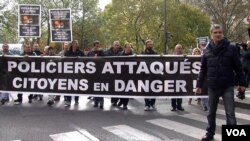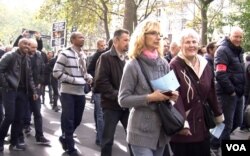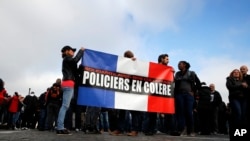After 32 years on the job, Laurent has seen just about everything: rising crime and incivility during his patrols northern Paris; an attack against his officers that left several hospitalized for weeks; and of course, a string of terrorist attacks in France that have increased his already heavy workload.
On Wednesday, he was back on the streets for a different reason, joining hundreds of police who have staged days of protests across France this month against a rising tide of violence and a dearth of means to respond to it.
"The equipment is becoming obsolete and we're working more and more hours," said Laurent, who like others at the march declined to give his last name. "We love what we're doing, but we're exhausted. We've had it."
The police protests, including nightly rallies in towns across the country, amount to an unprecedented show of anger by security forces who say they are overstretched by ordinary crime and new terrorist threats. They are demanding more staff and equipment to manage the workload.
On Wednesday, hundreds of police joined two rallies in the capital, brandishing banners and chanting, "Police attacked, the Republic in danger!" Other officers demonstrated elsewhere in France, hours before President Francois Hollande met with unions about their grievances.
The officers' anger is resonating with the public. A recent IFOP poll showed nine in 10 French considered the protests to be justified.
"These are my police, they need me and I'm here," said Marc Cecchetti, who counted many Parisians joining the Wednesday march.
As officers sang France's national anthem, he added, "We're facing a real battle against delinquency. It's time for people to support their police."
Added duties
Besides fighting ordinary crime, thousands of police, along with soldiers, have been posted to sensitive sites across the country since the Paris terrorist attacks, standing guard at schools, churches, synagogues and historic landmarks.
"We have to be a lot more vigilant," said one officer, who also complained of lack of downtime to see friends and family. "But we can't tell someone approaching us to stand back because he could be a potential terrorist."
Police have also been injured during labor protests this year, with demonstrators setting a police car on fire while two officers were still in it.
But it was an attack on two patrol cars in the Paris suburb of Viry Chatillon this month that proved the tipping point. The rampage by youngsters wielding metal bars and Molotov cocktails set the vehicles alight, severely injuring two officers.
"It was the spark that blew the whole thing up," said another veteran officer who gave only his first initial, "H," as he marched in northern Paris. "We feel tired, and we feel that our work doesn't make a difference. People aren't scared anymore when they get suspended prison sentences. They read 'freedom,' and we do, too."
Fewer resources
French Interior Minister Bernard Cazeneuve has met with police unions, promising to increase security and protection for officers, among other measures. But the announcements have not calmed police anger, with some calling for the resignation of National Police chief Jean-Marc Falcone.
The issue has become political fodder before French presidential elections next year. The country's former conservative president, Nicolas Sarkozy, who is staging another bid, cut police posts and jettisoned neighborhood policing during his time in office. Today, critics claim the measures have left officers with little contact with the communities they patrol and less chance to prevent radicalization and possible terror attacks.
But Hollande has also been criticized for failing to deliver on reforms promised to police a year ago.
"We must initiate a debate about the role of police in society," criminologist Mathieu Zagrodzki told France 24 TV. "We must redefine their missions, which today include anti-terrorism and anti-trafficking operations."
The relationship between police and citizens must also be rethought, he said, adding, "Today, the police are focused on politicians, whereas they must focus on citizens."
At the rally, officers interviewed voiced few concrete demands. Asked what he wanted from the government, Laurent replied, "Just recognition of the difficulties we encounter."






